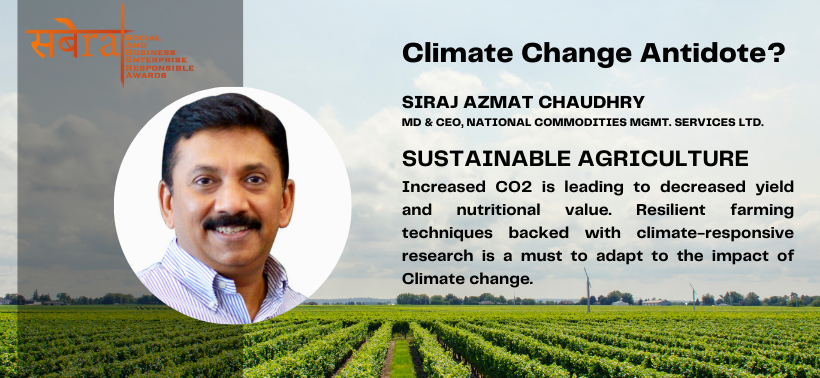Erratic Indian Monsoon
The months of monsoon are already underway but if we analyse its progress so far, it has been less than reassuring. Volatile weather is a given as far as monsoons in India are concerned but the significant increases in the frequency of dry spells and intensity of wet spells are adversely impacting agricultural yields, water resources, infrastructure, and livelihoods.
Challenge: Climate Change
Some researchers are attributing these changes to climate change stating that if global warming continues unchecked, summer monsoon rainfall in India will become stronger and more erratic in the coming years. Recently, a team of German researchers that have compared more than 30 climate models from all around the world have blamed climate change for the chaos in Indian Monsoon.
Findings like these revalidate the fact that climate change which as a subject was once confined to the TV studio discussions has now moved beyond the realm of those studios and is now a clear and present danger present in its full might impacting all walks of life including Agriculture.
Decreased agricultural yield
Climate change has been recognized as a future challenge to Indian agriculture and under the National Innovation in Climate Resilient Agriculture (NICRA) project, the Ministry of Agriculture and Farmers’ Welfare (MoAFW) has conducted climate change impact analysis, including the impact of the changing monsoon pattern. The findings indicate that crops like rice, wheat, maize, groundnut, chickpea, and potato do get impacted due to climate change and their production varies. A 1-2˚C increase in mean air temperature is expected to decrease rice yield by about 0.75 tonnes per hectare (t/ ha) in inland zones and 0.06 t/ha in coastal regions; while a 0.5˚C increase in winter temperatures is projected to reduce wheat yields by 0.45 t/ha
A similar study conducted under the National Network Project on Climate 18 Change (2004-13) to assess the impact of medium-term (2010-39) changes in climate on Indian agriculture indicated an average reduction in productivity of 4-6% in rice, 6% in wheat, 18% in maize, 2.5% in sorghum, 2% in mustard and 2.5% in potato.
Decreased Nutritional Value
Another area of concern is the impact of climate change on the nutritional value of crops. Numerous studies have attributed a decline in the nutritional value of crops due to higher levels of CO2as high CO2 leads to lower concentrations of important dietary micronutrients like zinc and iron in major food crops. High CO2 also has a negative effect on the nutrient value of staple crops like soybean and sorghum. Moreover, rising CO2 can also cause some food crops to produce more toxins. So when plants soak in an excess of CO2, their chemical composition changes in a way that’s harmful to the humans and animals that depend on them for nutrition.
Antidote: Sustainable Agriculture
Taking into account the findings of these studies, it makes sense to expedite the sustainable agriculture practices which could address the challenges of food security and waning farm incomes due to the change in climatic conditions.
Since 2014-15, India has had a National Mission for Sustainable Agriculture (NMSA) to promote sustainable agriculture. It consists of several programs focusing on agroforestry, rain-fed areas, water and soil health management, climate impacts, and adaptation. Apart from NMSA, the Pradhan Mantri Krishi Sinchai Yojana promotes the adoption of precision farming techniques such as micro-irrigation, and the Integrated Watershed Management Programme supports rainwater harvesting.
Diversification of cropping systems; promotion of carbon sequestration in agricultural practices and building resilience in soil; sustainable soil management practices; popularization of aerobic rice cultivation methods; water conservation and use efficiency, soil moisture management; and climate-responsive research programs are some of the key areas highlighted under the National Mission on Sustainable Agriculture.
More from less
To address the challenges posed by changes in climate patterns, the mantra of producing more from less should be adopted. This increase in productivity must be accomplished with less land per capita, less water supplies, less degradation of the environment, and less drain on the resources. Every effort should be made to derive greater output from the same amount of input and to achieve that farmers must embrace technologies and practices that obtain more output from existing resources.
Implementation of good farming practices such as the use of higher-yielding crop varieties, better and timelier cultivation and harvesting practices, knowledge of soil health management should be made mandatory for achieving the goal of resilient farming because the perils of climate change can only be counteracted through Sustainable Agriculture.
References:
https://www.teriin.org/sites/default/files/2021-04/TERI-FOLU_STI_Skills_Report.pdf
https://pib.gov.in/PressReleasePage.aspx?PRID=1630606
http://niti.gov.in/natural-farming-niti-initiative
https://nmsa.dac.gov.in/frmObjectives.aspx
https://www.ceew.in/sites/default/files/CEEW-Sustainable-Agricultre-in-India-2021-May21.pdf
http://www.fao.org/policy-support/tools-and-publications/resources-details/en/c/421726/
SABERA helps amplify Responsible Leadership and voices committed to GOOD.
Views are personal. The author Siraj Azmat Chaudhry is the MD & CEO of National Commodities Management Services Limited (NCML) and the Co-Chairman of the FICCI Committee on Agriculture. He has been acknowledged as a Changemaker for his pioneering work in edible oil fortification mandate to fight malnutrition. Siraj was the jury chair for SABERA 2020
If you or your organisation are promoting sustainable agriculture then the सबेरा SABERA 2021 jury is looking forward to your work under the Initiative Awards Sub Category A5: Krishi,& Gramin Vikas (Agriculture & Rural development)
Follow us on Linked in, Twitter, YouTube to never miss an update from SABERA. To submit your responsible work for SABERA 2021, Register here.
You may also like the article India’s opportunity to be a global leader on sustainable, affordable and green housing in tropical countries.


